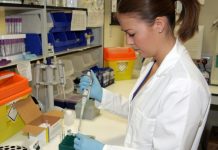A recent study at Weill Cornell Medical College has found that one of our body hormones may probably be used in treating anemic blood disorders called beta-thalassemia and hemochromatosis.
Beta-thalassemia, also known as Cooley’s anemia is so widespread that around 300,000 children in the world are born with this disorder each year; and around 1,000 people in the U.S. alone are infected by this.
Beta-thalassemia results in conditions like fatigue, diabetes, growth impairment, heart failure and osteoporosis due to excessive absorption of iron in the body.
According to Dr. Stefano Rivella, Weill Cornell Medical College, the iron overload reduces the lifespan of a red blood cell to half. These blood cells cannot function properly like the healthy ones.
Currently blood transfusion is used as the standard treatment for beta-thalassemia which is usually ineffective. The only other alternative is bone marrow transplant.
Human blood contains a hormone called hepcidin. This hormone was found to be at low levels in beta-thalessemia patients. Researchers are of the opinion that boosting the level of hepcidin can help treat the anemic blood patients effectively.












